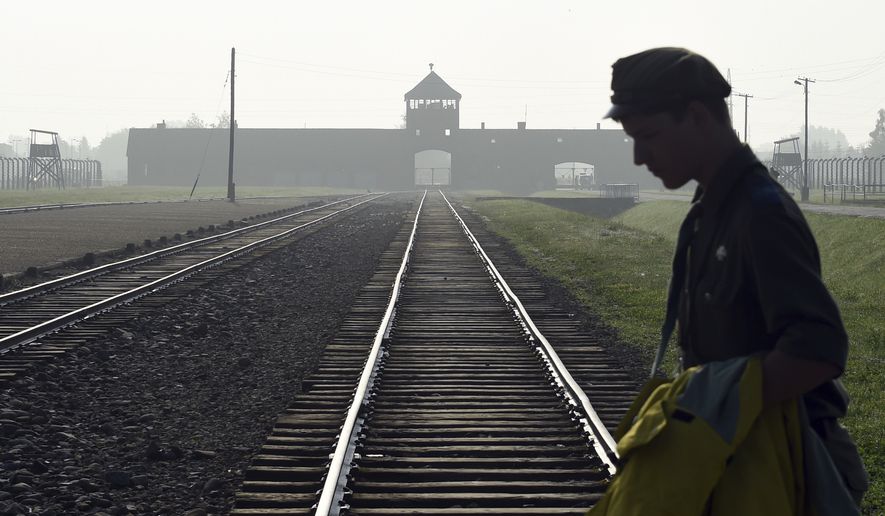OPINION:
History, Henry Ford famously said, “is bunk.” He might more accurately have said that history is not bunk, but a lot of interpretations of history are. Both winners and losers of the world’s wars have been guilty of twisting reality.
President Obama once referred to “Polish death camps,” whether by design or by a careless speechwriter, and it was a grievous mistake. Auschwitz, Sobibor, Treblinka, and other Nazi factories of death were indeed situated in Poland, but they were German, not Polish, death camps. Poles were rightly offended when Mr. Obama used the wrong word.
Many Poles are further offended by suggestions that some Poles were complicit in the slaughter of Jews, and the controversy has bubbled up again with the passage of a new law in Poland that threatens to distort tragedy and history. The law bans the use of the phrase “Polish death camps,” and accusations that some Poles were “complicit” in the Holocaust. Violators can be sentenced to three years in prison and required to pay large fines.
The new law would put two eminent Polish historians in jeopardy of losing their freedom. “I’ve read hundreds of survivors’ testimonies,” says the renowned Polish historian Jan Gross, “yet I do not recall a single one where the writer has not described an episode of betrayal, blackmail or denunciation on the part of their fellow Polish citizens.” Another distinguished Polish historian, Jan Grabowski, chronicles the role of individual Poles in the murder of their Jewish neighbors in his book, “Hunt for the Jews: Betrayal and Murder in German-Occupied Poland.”
No one suggests that such behavior of betrayal is universal. Yad Vashem, the Israeli institution dedicated to Holocaust education, recognizes thousands of Poles as “righteous among the nations” for their role in saving their Jewish neighbors. Poles were among the most heroic warriors against Nazi Germany in World War II. But the current Polish government cannot prevent the publication of books and expression of speech and expect the rest of the world to stay silent.
Secretary of State Rex Tillerson says the law “adversely affects freedom of speech and academic inquiry,” while making a point of pointing out the inaccuracy of the term “Polish death camp.” The new law has sparked a major row with Israel, with which Poland has had friendly relations. “I strongly oppose [the law],” says Israeli Prime Minister Benjamin Netanyahu. “One cannot change history and the Holocaust cannot be denied.” A Yad Vashem scholar says the law “is trying to prevent education, investigative journalism, interviews, radio discussions about parts of the Polish nation, parts of the Polish people who did terrible things. Certainly it was not the whole Polish nation by any means, but there were people who did terrible things and all that needs to be discussed.”
There is much to discuss. Before World War II, there were more than 3.2 million Jews in Poland, 10 percent of the population. Today that number is a mere 80,000. In the span of decades Poland has been transformed from a bicultural society to a largely mono-cultural society.
There’s a bitter irony to the new Polish law. Several West European nations — Austria, France, and Germany among them — have enacted laws to prohibit Holocaust denial. Several persons have been prosecuted. Many governments are afraid of free speech, and even the American guarantee of free speech under the First Amendment, the most precious of all the amendments to the Constitution, is unique in the world.
Fortunately, pushback against the new Polish law is having a positive effect. As a result of outside pressure, particularly from the United States and Israel, the Polish government has heard its allies and is trying to moderate the new law’s prohibition of free speech. Polish Justice Minister Zbigniew Ziobro now says the new law will not be implemented before the nation’s Constitutional Tribunal reviews the language of the law. Foreign Minister Jacek Czaputowicz says that questions about how to interpret the law will be taken into consideration by the tribunal.
History is complicated, and great care must be taken with both recording it and translating it, lest it become Henry Ford’s bunk. Free speech is the price we all pay for freedom, and such speech is always a threat to the comfort of governments. It is with indignation that we see that in our own country, with attempts, particularly on campus, to nibble at the free speech guaranteed by the Constitution. Eternal vigilance, in Poland as in the United States, is everybody’s responsibility.




Please read our comment policy before commenting.